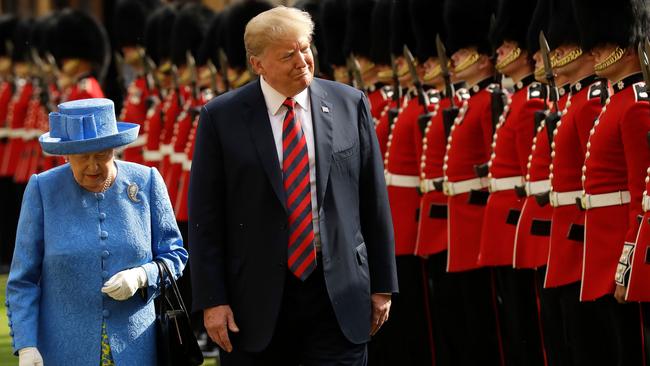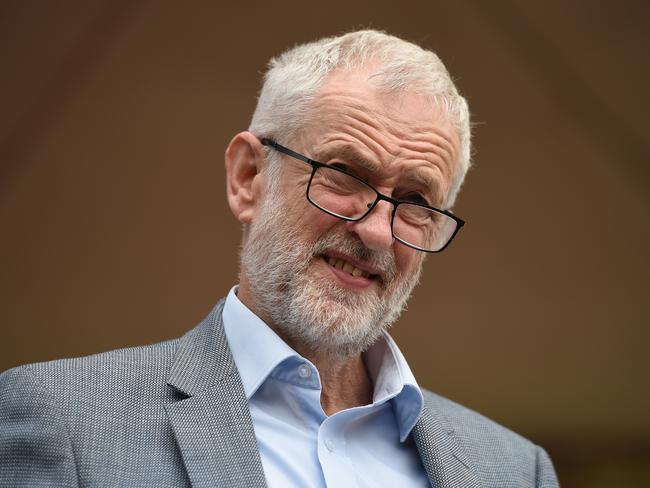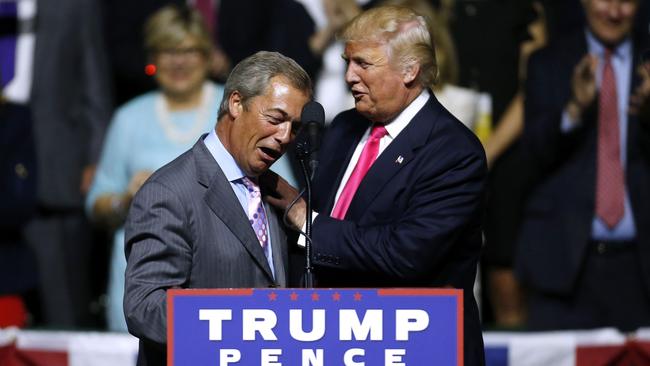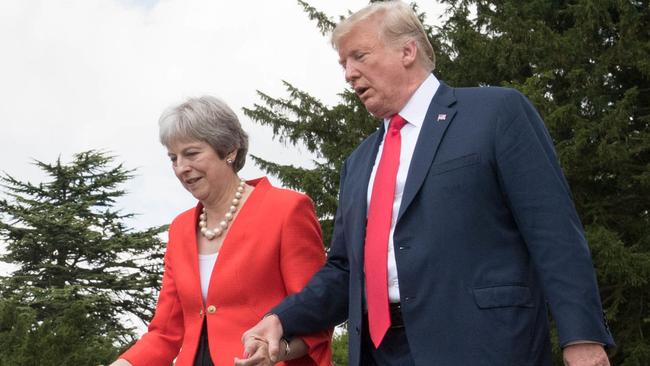Donald Trump says Jeremy Corbyn is ‘making a mistake’ if he is not America’s friend
Donald Trump warns Jeremy Corbyn’s refusal to get along with America will have consequences.

In an interview with The Sunday Times ahead of his state visit, Donald Trump speaks candidly about the Labour leader, how Britain should get the best Brexit deal and why he loves Nigel Farage and Boris Johnson.
Donald Trump would want “to know” Jeremy Corbyn before authorising American intelligence to share its most sensitive secrets with a British government run by the hard-left Labour leader, the president of the United States has told The Sunday Times.
In an interview in the Oval Office ahead of his state visit to Britain this week, Trump warned Corbyn that he was “making a mistake” by failing to make America a friend because of the close co-operation on military and intelligence affairs between his country and Britain.
The Labour leader has refused to attend the state dinner for Trump at Buckingham Palace tomorrow evening and regularly denounces US foreign policy. Asked about Corbyn’s Marxist economics and previous associations with terrorist groups such as Hamas and the IRA, Trump said: “I think he is probably making a mistake.
“We are very, very good for the UK if you look at what we do for the UK in terms of many things, including — obviously — the military [and] intelligence as well … I would think that somebody in that position would want to and have to get along with the United States.”
Asked if he would have qualms about sharing the most secret intelligence with a Corbyn government, Trump made clear it would be conditional: “I would have to know him. I would have to meet. I don’t know him but I would certainly — before I would answer that question I would have to get to know him a little bit.”

Trump’s approach to Corbyn mirrors his highly personal stance in negotiations with North Korea and China, where he has placed his personal rapport with foreign leaders above conventional diplomacy. It comes after Sir Richard Dearlove, the former head of MI6, said Corbyn would fail a security vetting if he applied for a job with the intelligence agencies.
Trump said he was “not offended” by Corbyn’s decision to turn down an invitation to the state dinner but his reticence could lead to dramatic changes in what is often described as “the most special part of the special relationship” — the Five Eyes intelligence sharing network that brings together spies in America, the UK, Canada, Australia and New Zealand.
SHOWDOWN ON HUAWEI
When the 45th US president arrives tomorrow he will be the focus of all the pomp and circumstance that the British state can muster. He will meet the Queen on his first day and hold talks with Theresa May at No 10 on Tuesday before attending the D-Day 75th anniversary commemorations a day later.
Behind the scenes there will be tense exchanges over security. Trump made clear that he intends to press the government to tear up a plan to give the Chinese telecoms giant Huawei access to Britain’s future 5G mobile phone network. He called on Britain to seek “alternatives” to the Chinese firm and “be very careful”.
Last year America passed legislation banning Huawei from doing business with the federal government. Last month Huawei was banned from Google’s Android platform. At a meeting of Britain’s National Security Council in April, May ignored the objections of five cabinet colleagues and cleared the way for Huawei to play a role in Britain’s 5G plans. She then sacked one of the rebels, Defence Secretary Gavin Williamson, who she blamed for leaking the decision.
Asked if he wants to see the next prime minister take a different stance, Trump said: “Well, you have other alternatives and we have to be very careful from the standpoint of national security. You see that maybe now more than ever before.”
John Bolton, the president’s national security adviser, has been lobbying his opposite number, Sir Mark Sedwill, to ensure the decision is reversed.
“We have been very, very open with your country having to do with security measures and intelligence,” Trump said.
“That is why we say it is very important that they study that situation very carefully … You know what has happened with Huawei … You know we have a very important intelligence gathering group, that we work very closely with your country and so you have to be very careful.”
He added: “Look, national security is so important, so we all have to be very careful together. And [the] UK understands that very well. Very well.”
There seemed to be an air of threat as well as statement about this sentence. He indicated that he thinks his pressure will ultimately lead to a change of heart in London when May stands down.
“It will all work out,” he said. “Things will all work out, you’ll see.”
HOT BUT NOT BOTHERED
When I met the president it was a baking hot day in Washington, where emotions were also running high. That morning the special prosecutor, Robert Mueller, who had concluded that Trump’s election campaign team did not collude with the Russians to get him elected, suggested that he might be guilty of obstruction of justice. “If we had confidence that the president clearly did not commit a crime, we would have said that,” Mueller intoned. A man then set himself on fire outside the White House, suffering injuries from which he died.
I had expected the White House to be a frenzy of activity. Instead, the West Wing was as quiet as a library. As I waited the vice-president, Mike Pence, offered a cheery “Hello” and Ivanka Trump, impossibly tall, treated me to a smile and a “Hi there” as she glided past. She will hold an event in Britain this week on women’s empowerment with the Defence Secretary, Penny Mordaunt.
The president himself was laid-back and courteous, not the bundle of irascible energy I had anticipated. He was perhaps a little tired after a state visit to Japan, but measured his words carefully as he sat at the Resolute desk gifted to America by Britain.
It is only when I looked back on the transcript that I realised how he bears no resemblance to the politicians I usually interview. However calmly, he says things that, bluntly, most leaders would avoid on the eve of a big trip pregnant with political pitfalls.
HOW TO DELIVER BREXIT
Trump has long seen his election victory in 2016 as a bigger version of Brexit and his frustration that the UK has not left the EU is palpable: “They gotta get it done. They got to get it done. They have got to get the deal closed, right?”
As a deal-maker himself, Trump was quick to offer advice to the next prime minister on how to go about it, urging May’s successor to go for a no-deal Brexit by the end of October. “If they don’t get what they want, I would walk away,” he said. “Yes, I would walk away. If you don’t get the deal you want, if you don’t get a fair deal, then you walk away.”
Trump argued that the UK should withhold the $71bn divorce bill to which May’s deal commits ministers. This equates to a nice round sum in America.
“If I were them, I wouldn’t pay 50 billion dollars ($71bn),” he said. “That is a big number. I wouldn’t pay 50 billion dollars ($71bn). That is me. I would not pay — that is a tremendous number.”
SEND FOR FARAGE
Risking further diplomatic awkwardness, Trump also said Nigel Farage, the Brexit Party leader, should be rewarded for his victory in the recent European elections with a place on the Brexit negotiating team. Of the Tories’ refusal to find a role for Farage, the president said: “I think it is a mistake. He has a lot to offer. He is a very smart person. They won’t bring him in. Think how well they would do if they did. They just haven’t figured that out yet.”
Farage and Trump got to know each other when the then Ukip frontman visited Trump’s presidential campaign in 2015. Trump’s admiration stems, he readily admits, from Farage’s admiration for him. “I like Nigel a lot,” the president said. “I got to know him when he liked my campaign and he actually came to a speech and I met him. I think he is a terrific person. Really, a terrific person.”

Referring to the Brexit Party’s success in the European elections, he added: “I hear he has done very well. I think he has got a lot to offer. Obviously a lot of people agree with me because I saw his numbers and they were very good. I will say very strongly he loves your country.”
HOW MAY BOTCHED BREXIT
One curious feature of this week is that Trump will hold talks with May just as she has become a lame duck prime minister. “You know, I like Theresa,” he said. “Theresa is a professional.” He admitted he told May: “You have to do it your way” when it came to the Brexit negotiations. But he did little to hide his view that the prime minister had botched the talks by failing to put the EU under pressure, leaving them “with all the cards”.

“I just think it is very hard for the UK to get a good deal when you go into negotiation that way,” he said.
“At the same time, I can’t blame the European Union because they had very little to lose. They had no downside. That is why they were … willing to give so little … It was always so tough.”
Last year May revealed that Trump had privately advised her to sue the EU. I asked him what he meant by that. Trump explained that it was a device to create more “ammunition” in the negotiations.
“What I would do is, for those mistakes made by the EU that cost the UK a lot of money and a lot of harm, I would have put that on the table, whether it is in the form of litigation or in the form of a request. But they chose not to do that.”
A TRADE DEAL
When he was last here in July 2018 Trump got into hot water for suggesting that signing up to the Brexit deal May had thrashed out at Chequers and cost her the chance of a free trade deal with America. He still thinks the two-year transition period agreed with Brussels is a problem: “One of the things that was, I think, very bad is to have this two-year moratorium on trade. That is terrible. That is a tremendous penalty.”
The president was, however, keen to offer the next prime minister a trade deal if he or she heads for a no-deal Brexit: “We have the potential to be an incredible trade partner with the UK. We’re doing relatively little compared to what we could be doing with UK … I think much bigger than European Union.”
Trump claimed that what Britain lost in trade with the EU after Brexit “we have tremendous potential to make up more than the difference. We will be talking to them about that.”
When I asked if Trump thought a trade deal could be concluded within a year, he said: “We could work on it much faster, we could work on it very, very quickly. There is tremendous potential with trade with the United States. They have never had a president like me that understands this. I would go all-out. It would be a great, a great advantage to [the] UK. A tremendous advantage.
“The European Union really precluded them from doing a lot of business with the United States … One of the advantages of Brexit is the fact that now you can deal with the No 1 country by far. We are the No 1 economy in the world by far and when UK isn’t prohibited from … making deals directly, the numbers they can do will be tremendous.”
BACKING BORIS
When I first arrived in the Oval Office — an experience not unlike stepping onto a film set where everything is familiar and both smaller and grander than you had imagined — Trump wanted to gossip about who the next prime minister might be. His press secretary, Sarah Sanders, was adamant that he would not endorse anyone but that message appeared not to have been made to Trump himself.
His words about Boris Johnson could not have been more effusive, describing him as “a friend” who “would do a very good job — he would be excellent”. His admiration for Johnson, like Farage, stems from the fact that “he has been very positive about me and our country”.
Most extraordinarily, Trump claimed he has been approached by other candidates seeking an endorsement. One of these, he hinted, was Jeremy Hunt, the foreign secretary, of whom Trump said: “Like him.”
If Michael Gove, who interviewed Trump when he first won the presidency, is seeking Trump’s approval he might be disappointed. It was not clear if Trump remembers who he is — or that his hearing is not what it used to be. When I suggested that Johnson was favourite but Gove was “coming up on the rails”, Trump replied: “Wow, from Wales?”
It is reassuring to know that we remain divided by a common language.
If Trump’s language is unfiltered he was unfailingly courteous. When his index finger sprung forwards like a lizard’s tongue and pressed a small red button on the desk I feared he was reaching for an ejector seat, or a panic button that would send the Secret Service bounding into the room to remove me. But he drawled: “Do you want a drink?”
Moments later glasses of Diet Coke, ice tinkling, appeared on the desk. At the end of the interview he called me back so I could get a picture in the Oval Office.
THE ROYALS
He is a president who understands the importance of putting on a show, which perhaps explains his love of the royal family. He says it will be “great seeing the Queen again” and that they had “a very good talk” last year. Trump will also take tea with the Prince of Wales who (along with Princes William and Harry) avoided meeting him last year.
Prince Charles is likely to raise the thorny issue of climate change. Trump insisted “I like Charles” but made clear he will not be lectured about America’s refusal to sign up to the Paris agreement.
“We have among the cleanest climate in the world right now,” he boasted, chin thrust forwards defiantly as if posing for an update of Mount Rushmore. He claimed America meets “a higher standard” even than the Paris demands.
The one royal Trump will not be seeing is the Duchess of Sussex who is on maternity leave, perhaps conveniently since she has dismissed the president as a “misogynist”. Trump says he was not aware she was “nasty” to him. But when I asked him if having an American princess was a good thing, he seemed ready to bury the hatchet: “I am sure she will go excellently. She will be very good.”
Trump’s visit will not see him interacting with the British public but this does not seem to have fazed the president, who is warm about the country and believes the sentiment is reciprocated.
“The UK is a very special place. My mother was born in Stornoway. I don’t imagine any US president was ever closer to your great land … I think I have great polls [in Britain] … I hope I am loved in UK. I certainly love the UK.”
This week will show if the feeling is mutual.
The Times


